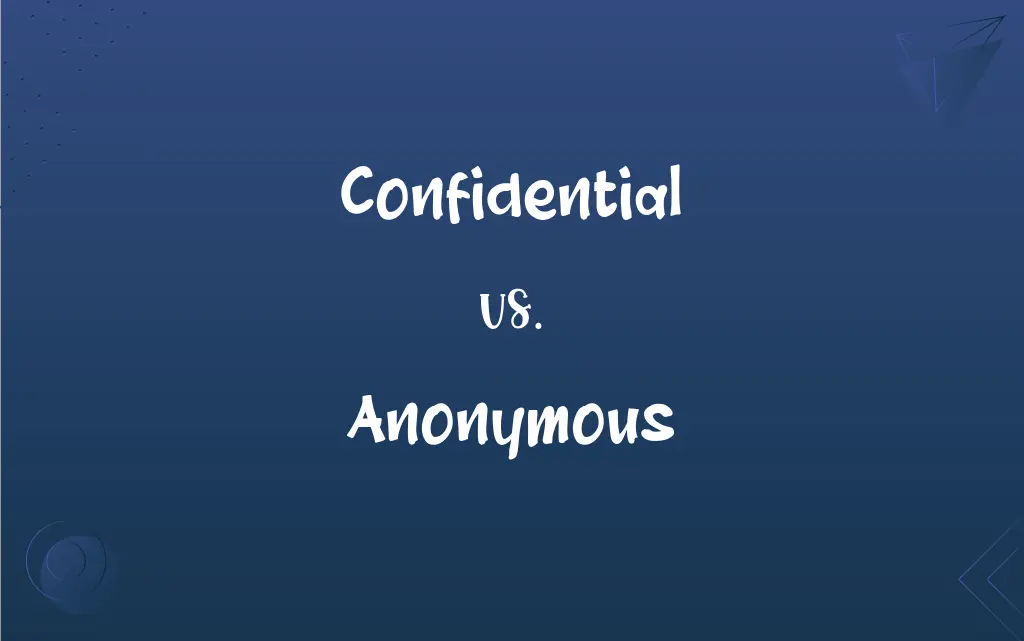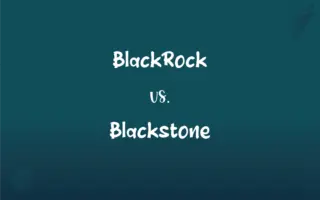Confidential vs. Anonymous: What's the Difference?
Edited by Aimie Carlson || By Harlon Moss || Published on November 23, 2023
Confidential refers to information kept secret; anonymous is without a known identity.

Key Differences
Confidential implies information that is intended to be kept secret or private, often shared within a limited group with the expectation of privacy. It carries a sense of trust and responsibility; disclosing confidential information typically requires consent or adheres to specific rules. The concept often arises in professional settings like law, healthcare, and business, where discretion is paramount. Anonymous, on the other hand, relates to an individual or action that lacks identifiable characteristics. When someone acts anonymously, their identity is not disclosed or is intentionally concealed. This can apply to actions, donations, publications, or any situation where the person's identity is either unknown or deliberately hidden. While confidentiality protects information, anonymity protects an individual’s identity.
Confidentiality and anonymity both involve privacy but differ in focus. Confidential dealings ensure that information shared remains within a trusted circle, emphasizing the content's privacy. Anonymous actions or communications, however, emphasize the subject's privacy. In some cases, anonymity can facilitate confidentiality; for example, when someone provides information anonymously, the content may be treated as confidential by the recipient. Conversely, confidential information may sometimes lead to identifying an anonymous individual, although this often goes against the principle of confidentiality.
In certain contexts, the lines between confidential and anonymous can blur. For instance, in a confidential survey, respondents' identities are known to the surveyor but not disclosed publicly. In an anonymous survey, the respondents’ identities are unknown even to the surveyor. Here, confidentiality is about safeguarding the link between the information and the individual, whereas anonymity is about removing that link altogether.
While confidentiality often relies on established protocols and legal frameworks to ensure information is kept private, anonymity can be more informal. Maintaining someone’s confidentiality often requires active measures, such as encryption or nondisclosure agreements. Anonymity, however, can sometimes be maintained by simply withholding one’s name or other identifying details. In digital spaces, however, maintaining anonymity can be more complex due to digital footprints and tracking technologies.
Confidentiality is often associated with professionalism and ethical responsibility. For instance, a lawyer keeping client information confidential is a matter of professional ethics. Anonymity, however, can have a broader range of motivations, from protecting personal privacy to avoiding repercussions. It can be used for noble reasons, like whistleblowing, or for nefarious purposes, like cyberbullying.
ADVERTISEMENT
Comparison Chart
Primary Focus
Protecting information
Concealing identity
Typical Context
Professional settings (legal, medical)
Various contexts (online forums, donations)
Legal Implications
Often governed by laws and agreements
Largely informal, but can have legal aspects
Relation to Identity
Identity known but protected
Identity concealed or unknown
Ethical Considerations
Bound by professional ethics and trust
Motivations vary; can be ethical or unethical
ADVERTISEMENT
Confidential and Anonymous Definitions
Confidential
Indicating privacy or secrecy.
The document was marked as confidential.
Anonymous
Not identified by name.
The donation was made by an anonymous benefactor.
Confidential
Intended to be kept secret.
The CEO shared confidential plans with the board members.
Anonymous
Not personally identifiable.
She expressed her opinions anonymously online.
Confidential
Entrusted with private matters.
As her lawyer, I must keep our conversations confidential.
Anonymous
Without any distinctive features.
The letter was sent from an anonymous address.
Confidential
Characterizing restricted information.
He had access to confidential company data.
Anonymous
Unacknowledged as the creator.
The poem was published anonymously.
Confidential
Requiring discretion or trust.
The therapist assured her that the sessions were confidential.
Anonymous
Lacking individual characteristics.
The artist chose to remain anonymous.
Confidential
Done or communicated in confidence; secret.
Anonymous
Having an unknown or unacknowledged name
An anonymous author.
Confidential
Entrusted with the confidence of another
A confidential secretary.
Anonymous
Having an unknown or withheld authorship or agency
An anonymous letter.
Anonymous
Having no distinctive character or recognition factor
"They were carried over a bridge above an anonymous parade of shops" (Elizabeth Speller).
FAQs
How do companies ensure confidentiality?
Through nondisclosure agreements, privacy policies, and secure systems.
Can anonymity be harmful?
Yes, if it’s used for malicious purposes like harassment or spreading false information.
What does “confidential” mean?
It means information that is meant to be kept secret or private.
Are anonymous sources reliable?
It depends on the context; they can be reliable but also lack accountability.
Why do people choose to remain anonymous?
For privacy, safety, or to avoid bias and judgment.
Are medical records confidential?
Yes, they are protected under laws like HIPAA in the U.S.
What motivates anonymous donations?
A desire to help without seeking recognition or attention.
Is confidentiality legally binding?
Often, yes, especially in professional settings.
How is anonymity ensured in voting?
Through secret ballots and procedures that protect voters’ identities.
Can someone be both confidential and anonymous?
Yes, if their identity is unknown and the information they provide is kept secret.
Why is confidentiality important?
To protect sensitive information and maintain trust in relationships.
What’s a confidential agreement?
A legal contract ensuring that shared information remains private.
Can anonymous feedback be valuable?
Yes, it can provide honest insights without fear of repercussions.
How does anonymity affect online behavior?
It can lead to more open expression but also to irresponsible behavior.
Do journalists keep sources confidential?
Yes, protecting sources is a key principle in journalism.
Can anonymous comments be traced?
Sometimes, especially if digital footprints are left behind.
What is a confidential employee?
An employee entrusted with sensitive or private company information.
What breaks confidentiality?
Sharing private information without consent or legal permission.
Does anonymity protect from legal actions?
Not always; legal systems can sometimes uncover anonymous identities.
Can confidential information be shared?
Only with consent or under specific legal conditions.
About Author
Written by
Harlon MossHarlon is a seasoned quality moderator and accomplished content writer for Difference Wiki. An alumnus of the prestigious University of California, he earned his degree in Computer Science. Leveraging his academic background, Harlon brings a meticulous and informed perspective to his work, ensuring content accuracy and excellence.
Edited by
Aimie CarlsonAimie Carlson, holding a master's degree in English literature, is a fervent English language enthusiast. She lends her writing talents to Difference Wiki, a prominent website that specializes in comparisons, offering readers insightful analyses that both captivate and inform.































































